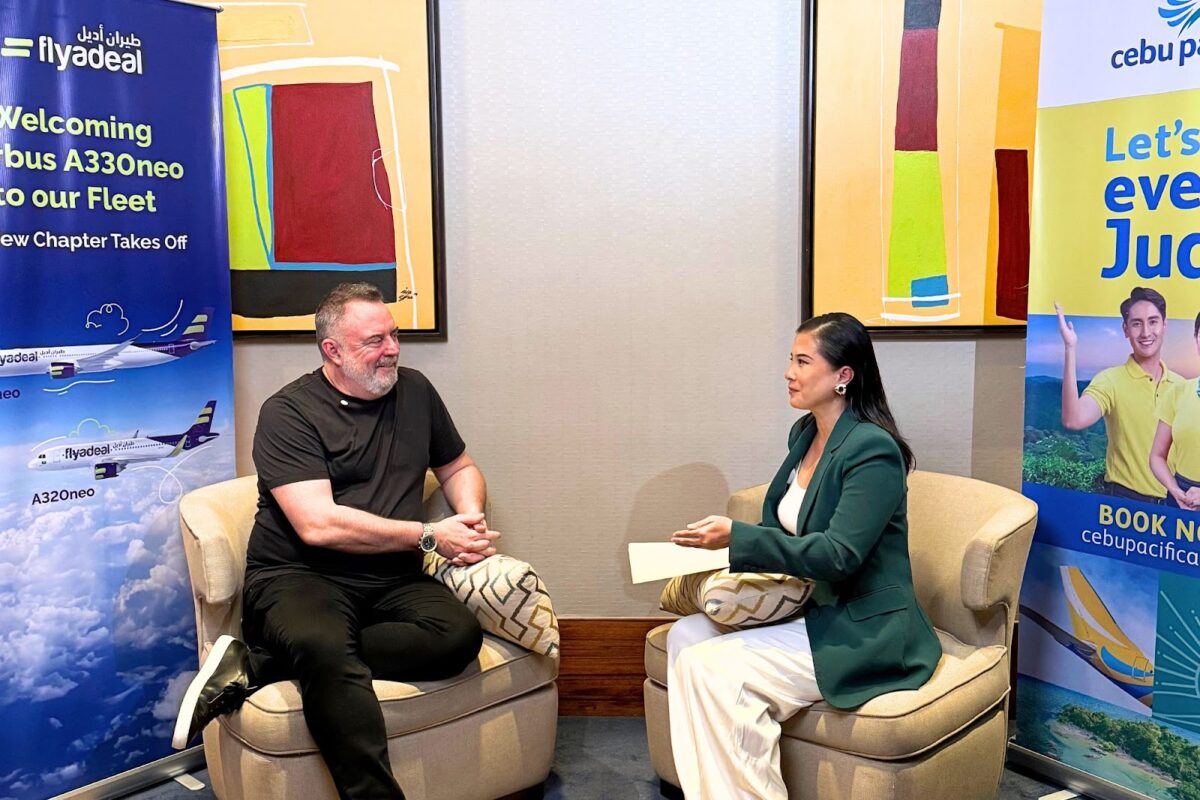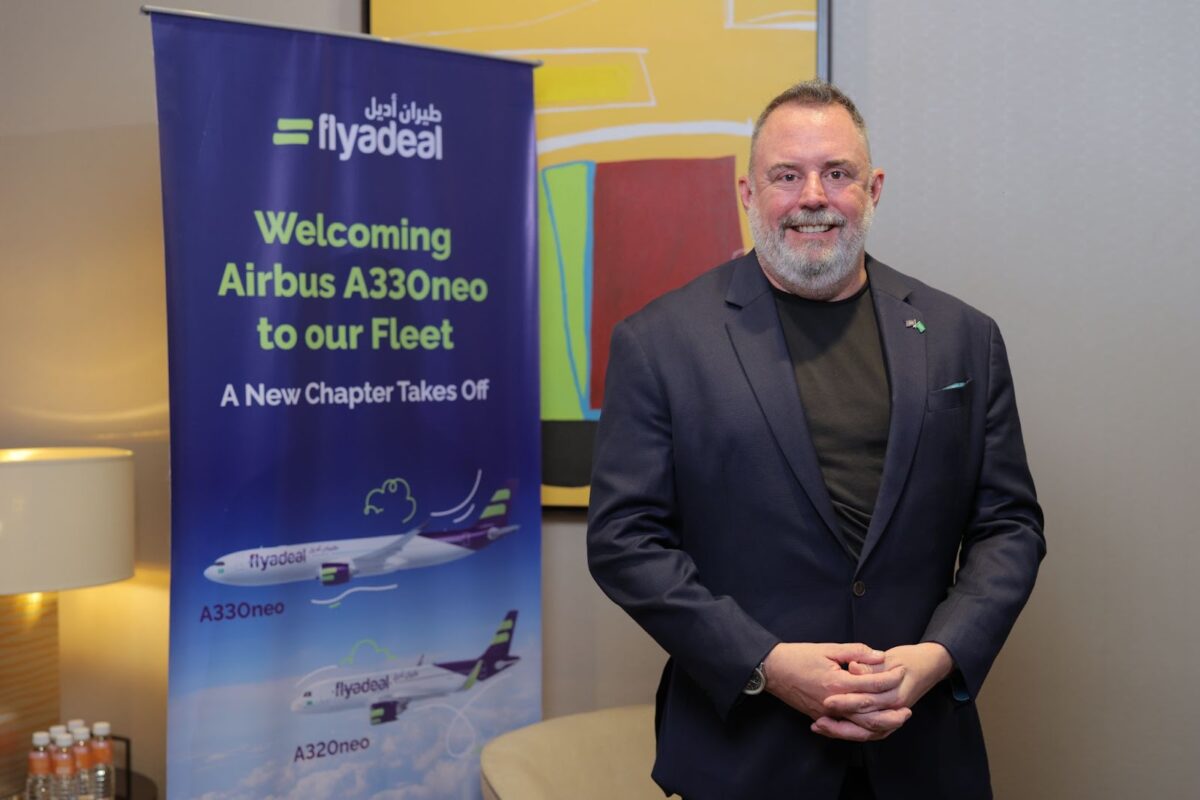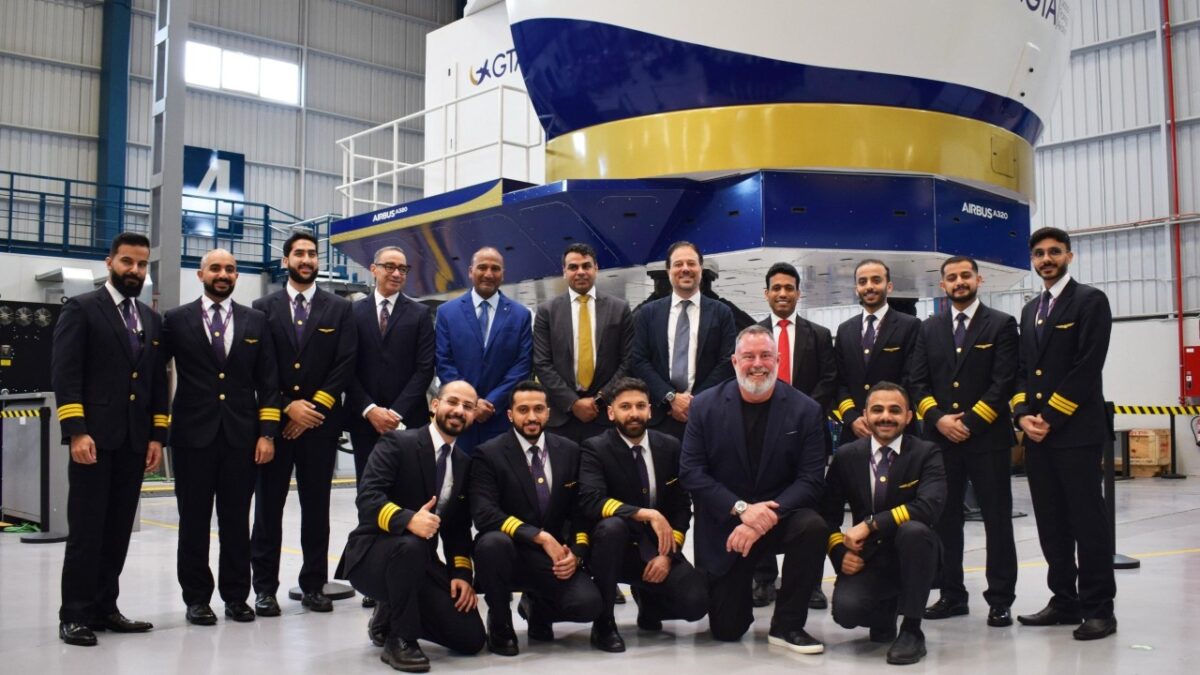Saudi Arabian low cost-carrier flyadeal is well on its way to strengthening its international reach, which it is doing one region at a time.
The airline’s current operations consist of 80% domestic and 20% international, but flyadeal plans to turn this into an even 50% split within the next two to three years.
On May 28, 2025, flyadeal announced that it had entered into a strategic partnership with Philippine low-cost carrier Cebu Pacific (CEB). The flyadeal contingent, headed by CEO Steven Greenway, flew to Manila to sign the Memorandum of Understanding (MoU), which covers a wet lease agreement and a wide range of opportunities in commercial cooperation and support in maintenance and engineering.
AeroTime caught up with Greenway in Manila for an exclusive Executive Spotlight interview, where he spoke about flyadeal’s partnership with CEB, Saudi Arabia’s growth, US President Trump’s visit to the Middle East, the airline’s expansion plans, and much more.
Expansion target: Southeast Asia
Since its launch in 2017, Jeddah-based flyadeal has operated mostly Airbus A320 family aircraft, although it has also occasionally wet-leased A330 aircraft from other carriers.
Outside the Middle East region, the low-cost subsidiary of the Saudia Group has already expanded to Africa and southeastern Europe.
On April 23, 2025, the carrier confirmed an order for 10 Airbus A330-900neo aircraft. Although this is the flyadeal’s first official widebody order, Greenway said the carrier had been wet leasing five A330s and one B777 aircraft for the last two years.
And according to the CEO, flyadeal’s latest target is Southeast Asia, predominantly because of labor and religious traffic.
According to Migration Data Portal information from January 2025, the Gulf Cooperation Council (GCC) region, primarily Saudi Arabia, Kuwait, Qatar, and the United Arab Emirates, hosts more than 22 million migrant workers, mainly from Southeast Asian countries including the Philippines, Vietnam, and Indonesia.
The Philippines, in particular, has a large number of migrant workers in the GCC region. According to a report by the Philippine Statistics Authority (PSA) from 2023, 10% of the country’s 114.9 million population were working and/or living overseas. In the GCC region, there are approximately two million Filipino migrant workers, with less than a million estimated to be in Saudi Arabia.
“It’s a massive movement. It’s large volumes, but low yield, that’s the critical piece,” Greenway said. “And so from that perspective, we just see this continuing to grow as the Kingdom keeps on investing, building and so forth.”
“The population is growing rapidly,” he continued. “There will be more demand for Filipino workers in Saudi Arabia, and we want to be able to support that right now.”
In terms of religion, Islam is the most widely practiced in Southeast Asia, with 42% of the region’s population (around 242 million) identified as practicing Muslims. While it is not an Islamic state, Indonesia is home to the largest Muslim population globally, numbering approximately 241.5 million. This number represents around 13% of the world’s Muslim population. Indonesia currently sends 220,000 pilgrims to Mecca, Saudi Arabia annually, the largest Hajj pilgrimage population from one country.
“Southeast Asia is our target,predominantly because of labor and religious traffic coming in for Umrah and Hajj,” Greenway explained before going on to reveal the routes flyadeal intends to operate with the 10 A330-900neo aircraft.
“Think Indonesia, think the Philippines, and Malaysia, subcontinent in terms of India, and then Europe.”
Greenway estimated that the carrier will be able to launch services to these destinations within two and a half years.
CEB partnership: complementing peaks and lows
Greenway shared that flyadeal’s milestone strategic partnership with Cebu Pacific was proposed over a casual dinner with CEB CEO Michael Szucs in Manila in early 2025.
“We [flyadeal] actually made a business trip down here in February to meet with the Cebu Pacific team because we were just about to complete and announce an order for the Airbus A330, our very first widebody order,” Greenway said. “And you know, sure enough, CEB has 11 of the aircraft. And when we asked Airbus who they think we should speak to, they said Cebu Pacific.”
During that fateful dinner with Szucs, Greenway said that they worked out that their businesses had “a lot” in common.
He said: “Number one, obviously, we’re both low-cost carriers [LCCs]. Number two, the knowledge sharing on the A330 was invaluable. But number three, there were opportunities actually to partner on a couple of things, and the wet lease in terms of their aircraft coming to the kingdom was one such example.”
“So the genesis of the relationship, the first thing really was about capacity sharing, that is what we worked out pretty quickly, that the low season in the Philippines is actually the high season in the Kingdom and things in Saudi Arabia and our low season is Cebu Pacific’s high season,” he added.
The first phase of the carriers’ MoU will see flyadeal utilize two of Cebu Pacific’s Airbus A320 aircraft on a wet lease arrangement for the upcoming summer peak flying season in Saudi Arabia. Reciprocally, CEB is also examining wet-leasing flyadeal’s A320s during the busy winter period in Southeast Asia at the end of the year.
On June 5,2025, two of CEB’s A320 (registration RP-C4262 and RP-C4263) wet-leased to flyadeal were spotted at Ninoy Aquino International Airport (MNL) in Manila. The aircraft featured a customized livery with both CEB and flyadeal colors and branding.
On June 15, 2025, Greenway posted an update to LinkedIn, marking the arrival of the two aircraft and officially welcoming them to the flyadeal fleet.
Saudi Arabia: open for visitors and the new growth engine in the GCC
The Kingdom of Saudi Arabia was founded in 1932 by King Abdulaziz. For much of its 92 years, the country’s economy has been highly reliant on its petroleum sector, which accounts for approximately 30% of its GDP.
Until 2019, international tourist access to Saudi Arabia was quite limited. Its tourism sector was largely focused on religious pilgrimages and business. But on September 27, 2019, the Kingdom issued tourist visas for the first time, opening its doors to international visitors.
This is part of Saudi Vision 2030, a reform program launched by the government to diversify its economy and reduce the country’s reliance on oil.
Australian-born Greenway, who considers Saudi Arabia his home, observed that the Middle East’s current growth is comparable to what Asia was like a decade ago.
“My observation comes from when I was at Scoot / Singapore Airlines in Singapore. I remember the days from 2005 to 2015 or thereabouts, Asia had China as a growth engine in the region,” he said. “We have Saudi Arabia now as a growth engine in the Middle East. The country is now accessible, you don’t need any special visas.”
Greenway, who was a founding member and Chief Commercial Officer of Singapore Airlines’ LCC subsidiary Scoot, also shared that Saudi Arabia’s domestic market is growing at 15% per annum, which he considers “huge”. He added that both the Kingdom and the Middle East as a region are becoming destination spots.
“You’ve got to remember that not long ago, people actually just transferred through Dubai. Now they’re getting off and staying a week or two or three, visiting friends, going on holidays,” he explained. “So the region itself is just changing dramatically. It is seen as a destination point in itself, not a transfer point. And we have Saudi Arabia as an example now opening up to the world and being able to bring in tourism and so forth.”
He added that this was something that could have never been considered five years ago.
Why flyadeal remains an Airbus customer despite US President Donald Trump’s visit
A couple of weeks before this Executive Spotlight interview took place, United States President Donald Trump conducted his first major international trip for his second term, visiting the Middle East from May 13 to 16, 2025.
Trump’s four-day trip, which included visiting Saudi Arabia, Qatar, and the United Arab Emirates, focused on securing deals for the US. One of these landmark deals was Qatar Airways’ $96 billion agreement to acquire up to 210 Boeing 787 Dreamliner and 777X aircraft powered by GE Aerospace engines.
According to the White House, this is Boeing’s largest-ever widebody order and largest-ever 787 order. It is expected to support 154,000 US jobs annually, totaling over one million jobs in the US during the course of production and delivery of the deal.
Greenway told AeroTime that despite the massive agreement, flyadeal will maintain its Airbus order.
“We’ve been an Airbus customer since day one. We’re very familiar with the aircraft and think that it is the best fit for our airline.”
He added that, “like any good LCC”, flyadeal will not be mixing fleets.
“We already have somewhat of a mixed fleet in terms of an A320 as a baseline, with 39 A320s arriving next year, and now we have the A330s,” Greenway said. “That’s enough variety for us.”
He said that ordering aircraft from different manufacturers will only bring in unnecessary complexities.
“As an example, our A320 pilots only need 10 days training to get onto an A330 aircraft. If we had a Boeing aircraft, it would probably take four months.”
However, Greenway said that Trump’s visit paved the way to something positive in terms of travel in the Middle East, particularly to Syria.
“What interestingly happened for us from President Trump’s visit was something that no one expected, [and that] was the normalization of a relationship with Syria. So sanctions were lifted and so forth,” he said. “If we had this discussion six months ago, I would have never imagined that we were going to fly to Iraq, Lebanon or Syria. And that’s what we’re doing.”
During his visit, President Trump issued an executive order to lift sanctions on Syria. Greenway said that because of this flyadeal is now set to fly there in the next couple of months.
“After a terrible 10 plus years of civil war, the market has now opened up. Relations have normalized with the United States. We now have access to this market,” he said. “So that’s an incredibly exciting piece that we didn’t see coming, and that was actually because of his [Trump’s] trip and meeting the leader of Syria only a couple of weeks ago.”
Wow Check out the Billboards all over Syrian thanking Trump for lifting Sanctions for them! What did he get for doing this! 😡😡😡😡 pic.twitter.com/9iMUAIma3u
— Suzie rizzio (@Suzierizzo1) June 9, 2025
The advantage of a political science degree in aviation
Most CEOs typically hold degrees in Management, Finance, or other business-related studies.
A 2019 Forbes study found that 53% of Fortune100 CEOs held Bachelor of Arts (BA) / Bachelor of Business Administration (BBA) degrees, while 47% received a Bachelor of Science (BSc) degree. 45% of those with a Bachelor of Science majored in a business field such as accounting or finance.
Greenway, who has served in numerous senior management roles (President, CCO, CEO, Board) for a number of aviation and travel companies, holds a double degree in Economics and Political Science from the University of Queensland.
“I always enjoyed the theory of economics, so going to university and studying that was a no-brainer for me. I was never going to be a doctor or anything, and I thought finance was a bit too boring, so economics was the one for me,” Greenway told AeroTime.
As for Political Science, Greenway said that he opted for the course because he planned to work for the Australian civil service.
“My view was, I was going to work for the Department of Treasury or somewhere I could leverage my economics degree, and I very much enjoyed politics, so that’s why I studied it. It only took me another year and a half to get a double degree,” he said.
According to Greenway, the economics degree proved useful in the first 10 years of his career and it was “more practical” in terms of the work he was doing.
Early roles in his career included serving as Senior eCommerce and Revenue Forecasting Analyst for Qantas, Head of Sales and Distribution Strategy for Virgin Atlantic, and Head of E-commerce of Virgin Australia (then called Virgin Blue).
As for his Political Science degree, Greenway said it played a part when he progressed to more senior management roles that required the fostering of global relations.
“Once you get to a more senior level, you’re having to deal with countries, governments, government officials, embassies. And I’ve found that my Political Science degree has sort of come to the fore in terms of what I was learning 20 years ago. It’s actually practical for what I’m doing today.”
Flexible but tough: What it takes to thrive in aviation
Greenway believes that there are three characteristics that allow people to thrive in an aviation career, particularly in the LCC sector:
A good cultural fit
“You can have words on a wall about a [company] culture, but I think culture is very organic and in some airlines it can be quite cliquey,” Greenway said.
Greenway believes that there is no “tick box” when it comes to a person fitting into an airline’s culture, and factors such as body language and personal interaction should be areas for consideration when both hiring and applying for positions.
“An LCC by definition, particularly in its management ranks, is quite small, so if you think that a person isn’t the right cultural fit, it’s probably not going to work,” he said. “It doesn’t mean the team has to be all the same size, but you’re looking for someone who can plug and play into the organization.”
Flexibility / willingness to multi-task
Another aspect that Greenway values in people is the ability to roll up their sleeves and “get into it.”
He added: “As an LCC, particularly with flyadeal, and I don’t think Cebu Pacific is any different, [people] don’t have just one job. You’re working on multiple jobs at any one time. Here I am being interviewed by you, and tomorrow I could be doing an aircraft leasing deal.”
Greenway also believes that being a multitasker involves having the willingness to say, “I’m not an expert, but I’ll find my way through.”
Stamina
Greenway said that the third element when working for an LCC is stamina.
“You’re going to get knocked around a little bit during your career. The LCC world is not easy. It’s very tough and you’ve got to be resilient. You’ve got to get back into the game, always focused and ready to climb that hill.”
Greenway said that all three of these attributes combined is more crucial than having a PhD or a particular degree.
“What can you bring to the table? Can you integrate effectively? Have you got a lot of resilience? Because you will have some times where you’re going to get knocked down, you need to get back into the game and keep on going.”
Attracting the right talent
In January 2025, AviationCV launched a pilot roadshow for flyadeal, which resulted in more than 800 applications.
Greenway said the roadshow had been “incredibly successful” and helpful in attracting the right talent.
“To be brutally honest with you, it [Saudi Arabia] probably wasn’t at the top of everyone’s list a couple of years ago,” he said. “Now, the Kingdom has opened up. People want to get to know what Saudi Arabia is because they’re going to make a decision not just about the employer, but the country they will work in. They want to know what they’re getting themselves into.”
Greenway said the pilot roadshow allowed flyadeal to convey to interested pilots not just information about the company, but also the changes in Saudi Arabia and what it is like to live there.
He added: “Hopefully, most people walked away and said, ‘You know what? That’s probably now at the top of my list.’”









